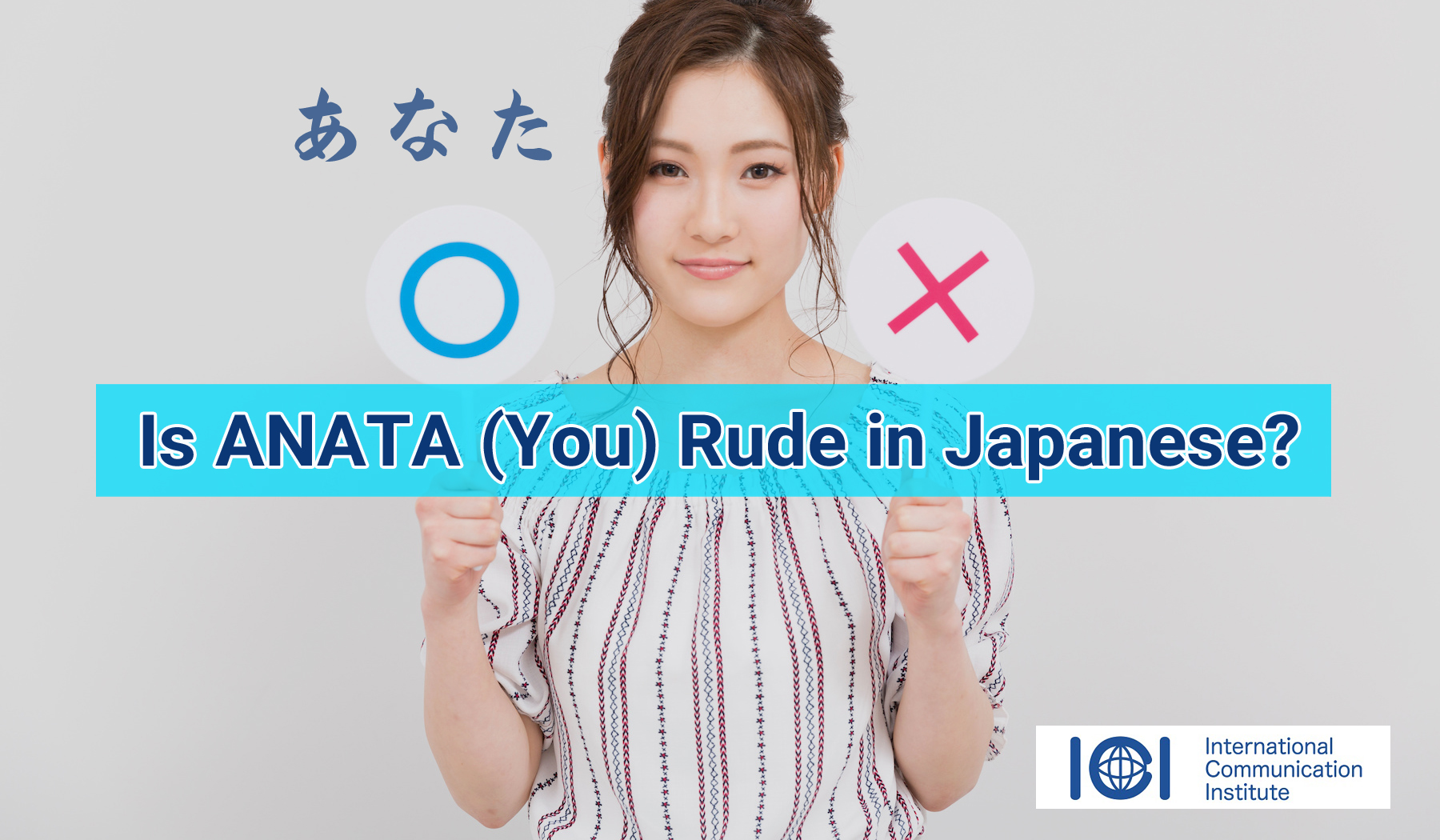
Is it bad to use Anata
When Japanese people explicitly state “you” in their sentences, it's proper to use the person's name and attach a suffix. You are probably already familiar with “~san”, which is a polite suffix. If you use “anata” with someone who you know, it is rude. So it's better to use name plus san.
Is Anata polite
Since あなた is still a somewhat formal-sounding word, it is not as obviously rude as derogatory pronouns like お前, or the very casual version of あなた — あんた. You can use あなた as a formality to sound rational and professional when you communicate negative emotions, such as anger, hatred, hostility, or a sense of rivalry.
What does it mean when someone calls you anata
“Anata あなた (You)” is a great word to use when addressing a stranger. It's a pretty formal way to address someone, but it also puts that emotional distance of “I don't really know you” between you and the person you're addressing. If you don't know someone's name, this is a pretty safe way to address them.
キャッシュ
Does Anata mean darling or you
あなた — Anata
It can be said in an endearing way, like “darling” or a pet name in English, but it is also often used to express exasperation. Mostly used by: You can use this to refer to a stranger. Women also use it to address their spouses.
Can I call my boyfriend anata
Anata means 'you' in Japanese. Pretty sure you've heard that it is considered rude to use it with people you are not close with. That is not the case between couples, though! Though this is more common among older generations, anata is a common term of endearment for wives to call their husbands.
Is Kimi or Anata rude
It is best not to think of them as a simple substitute for the word you in English. Kimi and anata are both polite, humble words that are used to express more than just pointing out the second person.
Is Kimi or Anata more polite
Generally speaking, "anata" is a neutral way of saying "you" while "kimi" is a very casual and rather boyish way of saying it. I would never say it's a vulgar way, but I can't imagine a situation where you should be using "kimi" although you can use it sometimes.
Is Anata used by couples
Anata, a Japanese language second-person pronoun, sometimes used by married couples to refer to their partners.
Is it rude to use Omae
It's generally a very rude and aggressive way to say "you" to your enemies.
Why do couples call each other anata
Anata means 'you' in Japanese. Pretty sure you've heard that it is considered rude to use it with people you are not close with. That is not the case between couples, though! Though this is more common among older generations, anata is a common term of endearment for wives to call their husbands.
What is the most polite form of you in Japanese
Polite Ways to Say “You” in Japanese貴方 (あなた) Anata. Found in textbooks, 貴方 is the most basic word for 'you'.諸君 (しょくん) Shokun. 諸君 means “you people”.君 (きみ) Kimi.お前 (おまえ) Omae.あんた Anta.手前 (てめえ)Temee.己 Onore.貴様 (きさま) Kisama.
Is Kimi wa rude
Informal “you”: 君 (kimi): used by men toward people of lower status. Typically not rude.
Which is more polite kimi or anata
Generally speaking, "anata" is a neutral way of saying "you" while "kimi" is a very casual and rather boyish way of saying it. I would never say it's a vulgar way, but I can't imagine a situation where you should be using "kimi" although you can use it sometimes.
How do you call someone respectfully in Japanese
When addressing someone you should suffix that person's surname with the term 'san'. So, if you're speaking to Mr Sato, then the correct way to address him would be as Sato-san. If you're speaking to Mrs Sato, then she too should be addressed as Sato-san.
Is Anata rude in Japanese
“Anata“ originally referred to somewhere unknown and far away. So, if you were to use “anata“ while knowing your counterpart's name, you would give a cold impression. It can be taken this way as rude!
What can you use instead of anata
Call someone higher than your position by their titles such as “Sensei [Teacher]”, “Senpai [Senior]”, and “Title” instead of “Anata”, or by the other person's name such as “Yamada-san” and “Taro-san”. Furthermore, by giving personal names such as “Taro-san/chan/Kun”, it becomes a friendly and polite expression.
What is the most respectful honorific in Japanese
4: Samaさま In the hierarchy of Japanese honorifics, this one sits at the top. Samaさま is a more formal term of address for those deserving of the utmost respect, those of higher rank, and anyone you'd like to communicate deference and admiration for.
What is the most respectful term in Japanese
San (さん), sometimes pronounced han (はん) in Kansai dialect, is the most commonplace honorific and is a title of respect typically used between equals of any age.Sama (様, さま) is a more respectful version for individuals of a higher rank than oneself.
Is San or Chan more respectful
Chan (ちゃん) is the childish version of san and refers to children and girls. The change from the “s” sound to “ch” is considered cute in Japanese. Chan could also be used to refer to an endearing adult. It is considered arrogant to refer to yourself in the third person in Japanese but chan is the exception.
How do you address a respectfully Japanese person
When addressing someone you should suffix that person's surname with the term 'san'. So, if you're speaking to Mr Sato, then the correct way to address him would be as Sato-san. If you're speaking to Mrs Sato, then she too should be addressed as Sato-san.


